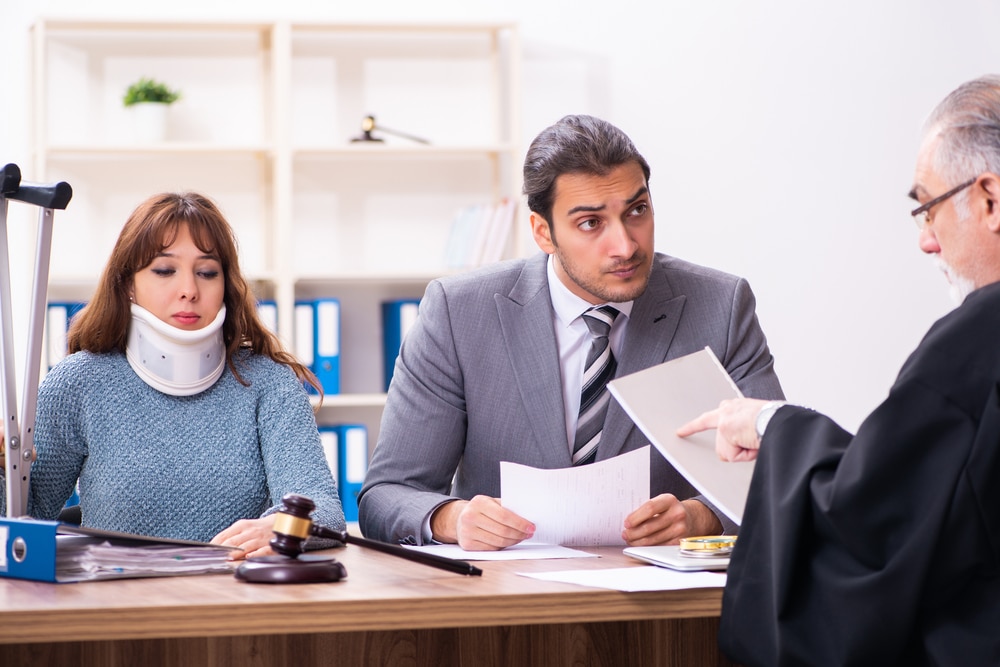Comprehending the Duty of an Attorney in Personal Injury Cases: What You Need to Know
Recognizing the function of an attorney in personal injury instances is necessary for those seeking justice. Lawyers play a crucial duty in steering via the complexities of the legal system. They collect evidence, establish obligation, and work out with insurance policy business. However, lots of people are uninformed of the complete degree of an attorney's obligations. What particular approaches do they utilize to shield their customers' legal rights and safe fair payment? The responses may shock you.
The Importance of Legal Depiction in Personal Injury Cases
Several people may consider taking care of personal injury insurance claims on their very own, the intricacy of lawful procedures often necessitates professional assistance. An attorney focusing on personal injury regulation brings vital experience to a case, maneuvering intricate legal structures that can overwhelm the untrained person - Social Security Disability Attorney. They comprehend the nuances of responsibility, insurance negotiations, and laws of restrictions, ensuring that clients do not miss out on critical target dates or opportunities
Lawful depiction can significantly enhance the opportunities of acquiring fair settlement. Attorneys are experienced in evaluating the true worth of insurance claims, factoring in medical expenses, lost salaries, and emotional distress. They have the settlement skills needed to deal properly with insurance companies, that usually aim to decrease payouts. Having an attorney can supply psychological assistance and reduce tension for clients throughout a difficult time, permitting them to concentrate on recovery while their case is properly handled.
Gathering Evidence and Structure a Strong Case
In personal injury instances, the collection of numerous sorts of proof is important for developing obligation and supporting a client's insurance claim. Documentation, including medical records, accident reports, and witness declarations, plays an important duty in developing a strong case. Lawyers must prioritize detailed evidence collecting to enhance the likelihood of a beneficial end result for their customers.

Types of Evidence Needed
When pursuing an individual injury instance, the collection of robust proof is crucial for establishing liability and supporting the complaintant's narrative. Key sorts of evidence include clinical records documenting injuries, which provide a factual basis for claims of physical injury. Photo proof catches the scene of the case, while witness statements can prove the complaintant's account. Additionally, cops records might offer an official point of view on the occasion. Security video, when offered, acts as an effective device to validate cases. Moreover, specialist testimony may clear up complicated problems, particularly in situations involving technical details. Collectively, these types of proof aid produce a detailed instance that boosts the possibility of a favorable outcome for the injured event.
Value of Documentation
Paperwork plays a vital duty in the success of personal injury cases, serving as the foundation whereupon cases are developed. Thorough and precise documents permits attorneys to collect and present important proof, such as clinical records, mishap reports, and witness statements. This proof not just validates the target's insurance claims yet likewise reinforces their instance for payment. On top of that, detailed paperwork helps in developing the extent of injuries and the effect on the target's life, helping with arrangements with insurance provider. By diligently organizing and taking care of these papers, attorneys can successfully advocate for their customers, making sure that no substantial information are overlooked. Inevitably, well-kept paperwork is crucial for attaining beneficial results in personal injury litigation.
Comprehending Liability and Neglect

In personal injury situations, lawyers play a substantial duty in gathering evidence and building a strong situation around these concepts. They evaluate the conditions bordering the incident, determine accountable celebrations, and express the violation of task that occurred. Comprehending these concepts is essential for both customers and attorneys as they navigate the intricacies of personal injury law.
Negotiating With Insurance Provider
Negotiating with insurer calls for a tactical strategy to protect reasonable settlement for personal injury claims. Attorneys play an important function in this procedure, leveraging their understanding of insurance coverage and negotiation tactics to advocate for their customers properly. They start by collecting thorough documentation, including clinical documents, mishap reports, and proof of damages, to build a compelling situation.
Lawyers typically initiate the settlement by providing a demand letter outlining the case's information and the preferred settlement quantity. This letter functions as a starting point for conversations. During settlements, lawyers remain assertive yet specialist, countering reduced deals with factual evidence and highlighting the toughness of their case.
Additionally, attorneys understand the significance of persistence in negotiations, as insurance provider might utilize strategies to postpone or minimize payouts. Ultimately, their competence assists assure clients receive a settlement that accurately shows the extent of their injuries and losses.
Preparing for Trial: What to Anticipate
Planning for test in an accident instance involves an organized method to recognize the test procedure and the crucial evidence that will exist. Lawyers need to describe the steps of the test, guaranteeing their clients are mindful of what to anticipate. In addition, they should identify and organize key evidence that will certainly support the situation and influence the jury's decision.
Trial Process Overview
The trial process in personal injury cases needs mindful organization and tactical preparation. Lawyers need to prepare their instance diligently, making sure all needed paperwork, witness checklists, and legal arguments are in order. The discussion of opening declarations sets the phase, allowing each side to describe their point of view. Following this, the complainant's instance unravels, where experts and witnesses give statements sustaining the insurance claim. The protection then offers its case, commonly intending to test the plaintiff's debates and evidence. Throughout the trial, lawyers have to remain vigilant, adjusting techniques as essential based on the unraveling characteristics in the court room. The trial ends with closing arguments, where both sides summarize their placements before the court deliberates, causing a verdict that can greatly influence the lives involved.
Key Evidence Presentation
While the trial procedure calls for a thorough understanding of lawful techniques, the discussion of crucial proof stands as an important element in persuading the jury. Attorneys must meticulously gather and organize proof, guaranteeing it matters, acceptable, and engaging. This includes medical documents, crash reports, witness testimonies, and expert point of views. Reliable storytelling through these items of proof can substantially affect a jury's perception. Visual help such as pictures or diagrams might also improve comprehension and retention. On top of that, lawyers have to anticipate counterarguments and prepare to resolve them, strengthening the stamina of their situation. Inevitably, the means evidence exists can identify the outcome of the trial, making it vital for lawyers to understand this critical aspect of litigation.
The Duty of Professional Witnesses in Personal Injury Situations
Professional witnesses play an essential function in personal injury cases, as their specialized expertise can substantially influence the result of litigation. These professionals give critical insights right into complex matters that call for competence beyond the average juror's understanding. Clinical specialists can clarify the degree of injuries and the needed therapy, while accident repair professionals can clarify how an occurrence took place.
Their testament commonly assists develop obligation and the seriousness of problems, making it simpler for courts to understand the nuances of a case. Furthermore, specialist witnesses add to the integrity of the offered evidence, directory enhancing arguments made by lawyers. In several circumstances, their participation can guide jury perceptions and ultimately affect settlement negotiations. Consequently, picking the right skilled witness is a critical method for attorneys aiming to reinforce their case and supporter effectively for their clients' civil liberties and compensatory cases.
Shielding Your Rights Throughout the Lawful Process
In the quest of justice within personal injury instances, protecting the civil liberties of customers remains a fundamental obligation for attorneys. Throughout the legal process, lawyers act as advocates, ensuring that customers comprehend their rights and the ramifications of their choices. They faithfully browse complicated legal systems, guarding customers from possible pitfalls that could endanger their cases.
Lawyers also function to gather proof, connect with insurance coverage business, and work out negotiations, all while keeping their customers educated. They make sure that customers do decline unfair deals or forget substantial legal deadlines. By supplying specialist support, attorneys empower customers to make informed selections, strengthening their legal rights.
Moreover, lawyers prepare for possible lawsuits, furnishing clients with expertise regarding court procedures and possible outcomes. This thorough support aids customers really feel positive and safe and secure, understanding Social Security Disability Attorney their civil liberties are supported throughout the legal trip. Ultimately, an attorney's role is essential for achieving a reasonable resolution in personal injury cases
Often Asked Concerns
Just How Much Does Employing an Individual Injury Lawyer Commonly Price?
Hiring a personal injury attorney generally sets you back around 33% of the negotiation quantity, though charges may differ based on intricacy and jurisdiction. Some attorneys might additionally supply contingency cost arrangements, ensuring repayment just upon successful recovery.
What Should I Do Immediately After an Injury Occurs?
Immediately after an injury happens, one should look for clinical focus, record the incident details, gather witness information, and inform pertinent authorities. These steps are crucial for guaranteeing correct care and preserving proof for any possible insurance claims.
For how long Does a Personal Injury Case Usually Take?
An accident situation typically takes anywhere from a couple of months to numerous years to settle, depending upon elements go to my site like case complexity, settlement processes, and court routines. Each instance is unique and differs substantially in period.
Can I Manage My Personal Injury Situation Without an Attorney?
Yes, a person can manage a personal injury situation without an attorney. Maneuvering through legal intricacies, recognizing treatments, and bargaining negotiations might confirm challenging, potentially influencing the outcome and settlement received in the situation.
What Kinds Of Damages Can I Assert in an Injury Instance?
In a personal injury case, one can assert numerous damages, including clinical expenditures, shed wages, pain and suffering, emotional distress, building damage, and in some instances, revengeful problems focused on deterring future oversight.
Understanding the function of an attorney in individual injury situations is crucial for those seeking justice. An attorney specializing in individual injury law brings vital experience to a case, navigating elaborate legal frameworks that can bewilder the inexperienced individual. In personal injury cases, attorneys play a substantial role in gathering proof and building a solid situation around these principles. In the pursuit of justice within personal injury cases, securing the legal rights of customers remains a fundamental responsibility for lawyers. An individual injury situation usually takes anywhere from a couple of months to numerous years to settle, depending on factors like situation complexity, negotiation procedures, and court timetables.